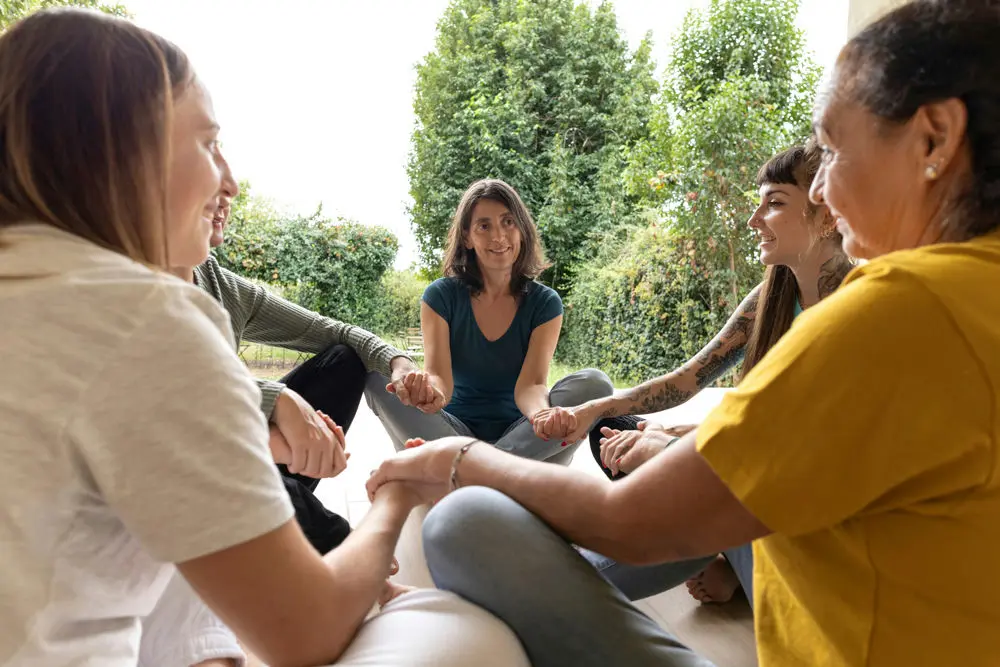Searching for mental health therapy can feel overwhelming, especially if it is your first time looking for support. Many people in Florida want to know which mental health therapy is truly effective when dealing with emotional, psychological, or behavioral challenges, including a wide range of mental health disorders.
Mental health therapy refers to professional care that helps individuals manage problems like anxiety, depression, trauma, or other mental health conditions. At Harmony Hills in Florida, treatment is delivered by licensed professionals (mental health professionals such as therapists, counselors, and psychiatrists) in a supportive, confidential environment. The focus is on using methods that have been shown by research to work for most people.
One important approach is called “evidence-based therapy.” These are mental health therapies that have been tested in scientific studies and shown to be effective for certain conditions. Harmony Hills emphasizes evidence-based mental health therapies as part of its commitment to providing quality care for individuals and families, with the goal of improving overall well-being.
Therapy at Harmony Hills
Many evidence-based therapies are used throughout Florida to address a range of mental health concerns and psychiatric conditions. The list includes several well-studied therapy modalities, each with its own approach and focus. If you are experiencing mental health or psychiatric challenges, it is important to seek professional help from qualified mental health professionals.
Cognitive Behavioral Therapy
Cognitive Behavioral Therapy in Florida (CBT) is a type of therapy that helps people identify and change unhelpful thoughts and behaviors. CBT often involves learning new ways to cope with challenging situations by practicing different thinking and behavior patterns. This therapy is commonly used for depression, anxiety disorders, PTSD, and obsessive-compulsive disorder. According to the National Institute of Mental Health, about 60% of people with depression who receive CBT experience significant improvement.
Dialectical Behavior Therapy
Dialectical Behavior Therapy in Florida (DBT) is a structured therapy that teaches skills for managing emotions, handling stress, and improving relationships. DBT was originally developed for borderline personality disorder but is also used for mood disorders, self-harm behaviors, and eating disorders. DBT helps people practice mindfulness, tolerate distress, and communicate more effectively.
Eye Movement Desensitization and Reprocessing
Eye Movement Desensitization and Reprocessing (EMDR) is a therapy used mainly for trauma and posttraumatic stress disorder (PTSD). During EMDR, the therapist guides the person to recall distressing memories while moving their eyes back and forth or focusing on other types of rhythmic stimulation. This process helps the brain reprocess traumatic memories so they become less upsetting over time.
Motivational Interviewing
Motivational Interviewing (MI) is a conversational therapy that helps people explore and resolve any uncertainty they have about making changes in their lives. MI is often used with people who are working on substance use issues, but it can also support other mental health treatment goals. It is often used together with other evidence-based therapies.
Additional Evidence-Based Therapeutic Modalities
Other important evidence-based therapy modalities and EBP therapy options available in Florida include:
- Acceptance and Commitment Therapy: Focuses on helping people become more flexible in their thinking and actions.
- Interpersonal Therapy: Addresses issues in relationships that may affect emotional health.
- Prolonged Exposure Therapy: Used for PTSD and anxiety disorders by helping people gradually face feared memories or situations.
- Family Therapy: Uses evidence-based approaches to improve communication and functioning within families.
How Evidence-Based Psychotherapy Works in Florida
Evidence-based practices in mental health involve using therapies and approaches that have been tested by research and follow guidelines set by professional organizations. Florida’s mental health system, like those in many other states, relies on these methods to give people care that is consistent, safe, and meets state regulations. Providers in Florida are required to be licensed and follow rules set by the Florida Department of Health and other state agencies. This ensures that mental health therapies are delivered by qualified professionals. For example, psychiatrists are able to prescribe medications, while psychologists’ ability to do so varies by state. This distinction helps ensure that treatment plans follow current scientific standards.
Treatment Settings and Delivery Methods
Mental health therapy in Florida is offered in several ways:
- Inpatient programs: These are residential settings where individuals live at the facility and receive care and supervision around the clock. Treatment is structured, and daily activities are planned by clinical staff.
- Outpatient therapy: Individuals attend scheduled therapy sessions at a clinic or provider’s office while continuing to live at home. Sessions are usually once or twice per week.
- Intensive outpatient programs: These programs provide more frequent therapy sessions, often several times a week, but do not require overnight stays. People can maintain normal routines but attend more hours of therapy.
- Telehealth options: Therapy is provided through secure video calls or online platforms, making mental health services more accessible to people in rural areas or those unable to travel.
Addressing Co-occurring Disorders
Evidence-based treatments often address both mental health and substance use disorders at the same time, which is called dual diagnosis treatment. This approach recognizes that conditions like depression, anxiety, or PTSD can occur alongside substance use problems. At Harmony Hills, licensed professionals deliver integrated care using evidence-based practices designed for dual diagnosis. Treatment plans are created to manage symptoms from both mental health and substance use disorders, and therapies are selected based on current research and guidelines for co-occurring conditions. This method allows for coordinated care and helps improve outcomes for people experiencing multiple challenges at once.
Benefits and Challenges of Evidence-Based Practices in Therapy
Evidence-based therapy practices use approaches supported by research and tested in real-world settings. These methods are often used in counseling to help people with mental health concerns.
There are both strengths and limitations to using evidence-based therapies. Benefits include research-backed effectiveness, structured methods, and the possibility of insurance coverage. Challenges can include limited flexibility for cultural differences and the need for providers to have specialized training. Some clients may find the structured approach less comfortable, and access to these therapies may vary depending on location.
| Benefits | Challenges
|
| Proven effectiveness through research | May not address individual cultural factors |
| Standardized treatment protocols | Requires specialized training for providers |
| Insurance coverage more likely | Can feel rigid or structured for some clients |
| Measurable progress tracking | Limited availability in some areas |
Steps to Begin EBP Treatment in Florida
Starting mental health therapy using evidence-based modalities is a straightforward process. These steps help ensure that mental health support is based on proven methods and delivered by qualified professionals.
Step 1: Research Licensed Providers
Finding a therapist who practices evidence-based counseling starts with checking licenses and credentials. Many providers list their qualifications on state licensing boards, professional association directories, or their own websites. It is common for therapists to outline their specific training in evidence-based practice therapy methods, such as CBT or DBT, and to describe their continuing education in these areas.
Step 2: Schedule a Comprehensive Assessment
The first appointment with a provider usually includes a detailed assessment. During this meeting, the therapist gathers information about symptoms, history, and current challenges. This assessment helps identify which evidence-based treatments and other mental health therapy options align with the person’s needs and sets a direction for the therapy process.
Step 3: Develop a Personalized Treatment Plan
After the assessment, the provider creates a treatment plan. This plan is based on evidence-based practices and tailored to address the individual’s unique situation, diagnosis, and goals. While the core methods of evidence-based therapy remain consistent, the plan is adjusted to reflect the specific concerns and preferences of the person seeking help.
Step 4: Engage in Regular Progress Monitoring
Throughout therapy, progress is measured using tools like symptom checklists, feedback forms, or regular check-ins. Providers use this information to track changes, make data-driven decisions, and modify the approach if necessary. This process supports ongoing adjustment and ensures that the treatment remains effective over time.
Moving Forward with Proven Mental Health Therapies
Choosing evidence-based treatments is central to effective care for mental health concerns. These therapeutic approaches are supported by research and clinical guidelines. The aim is to match the therapy to the individual’s needs and the specific symptoms they are experiencing.
Harmony Hills uses a comprehensive approach to mental health treatment. The center relies on a multidisciplinary team, including therapists, counselors, psychiatrists, and medical professionals, who each contribute their expertise. Every person receives a personalized treatment plan, which is developed using evidence-based practices and tailored to their goals and challenges.
This approach supports Florida residents by providing access to therapies that have been shown in studies to help with a variety of mental health conditions. Harmony Hills continues to update its practices as new research emerges, ensuring that care stays current with national standards for evidence-based therapy.
Frequently Asked Questions About Evidence-Based Mental Health Therapies
Does insurance typically cover evidence-based therapy in Florida?
Most insurance plans include coverage for evidence-based treatments because these therapies have strong research backing, but insurance benefits can differ depending on the specific plan.
How long do evidence-based mental health treatments usually take to show results?
Many people start to notice changes after 8 to 16 sessions, but the timeline can be shorter or longer depending on the individual and the condition being treated.
What makes evidence-based psychotherapy different from regular counseling?
Evidence-based psychotherapy uses treatments that have been tested in research studies and follow set guidelines, while regular counseling often relies on general conversation and support without specific research-based methods.
Can evidence-based treatments be combined with medication?
Evidence-based therapy is often used together with psychiatric medications when a provider believes this combination is helpful for the person’s needs.
Contact Harmony Hills for a confidential assessment or to learn more about our evidence-based treatment options in Florida. Our compassionate team is here to guide you toward lasting recovery and renewed hope.
References
- American Psychological Association. (2021). Policy statement on evidence-based practice in psychology. https://www.apa.org/practice/guidelines/evidence-based-statement
- National Institute of Mental Health. (n.d.). Psychotherapies. https://www.nimh.nih.gov/health/topics/psychotherapies
- S. Department of Veterans Affairs. (2024). Evidence-based therapies. https://www.mentalhealth.va.gov/get-help/treatment/ebt.asp
- Substance Abuse and Mental Health Services Administration. (2024). Evidence-based practices resource center. https://www.samhsa.gov/resource-search/ebp
- Cook, S. C., Schwartz, A. C., & Kaslow, N. J. (2017). Evidence-based psychotherapy: Advantages and challenges. Neurotherapeutics, 14(3), 537-545. https://www.ncbi.nlm.nih.gov/pmc/articles/PMC5509639/
- Canadian Psychological Association. (2012). Evidence-based practice of psychological treatments: A Canadian perspective. https://cpa.ca/docs/File/Practice/Report_of_the_EBP_Task_Force_FINAL_Board_Approved_2012.pdf
- Florida Department of Health. (2025). Mental health counseling licensure. https://floridasmentalhealthprofessions.gov/licensing/mental-health-counselor/
- National Institute on Drug Abuse. (2024). Principles of drug addiction treatment: A research-based guide (Third Edition). https://nida.nih.gov/publications/principles-drug-addiction-treatment-research-based-guide-third-edition/evidence-based-approaches-to-drug-addiction-treatment
- Centers for Medicare & Medicaid Services. (2024). Behavioral health services. https://www.cms.gov/medicare-coverage-database/view/article.aspx?articleid=56587




